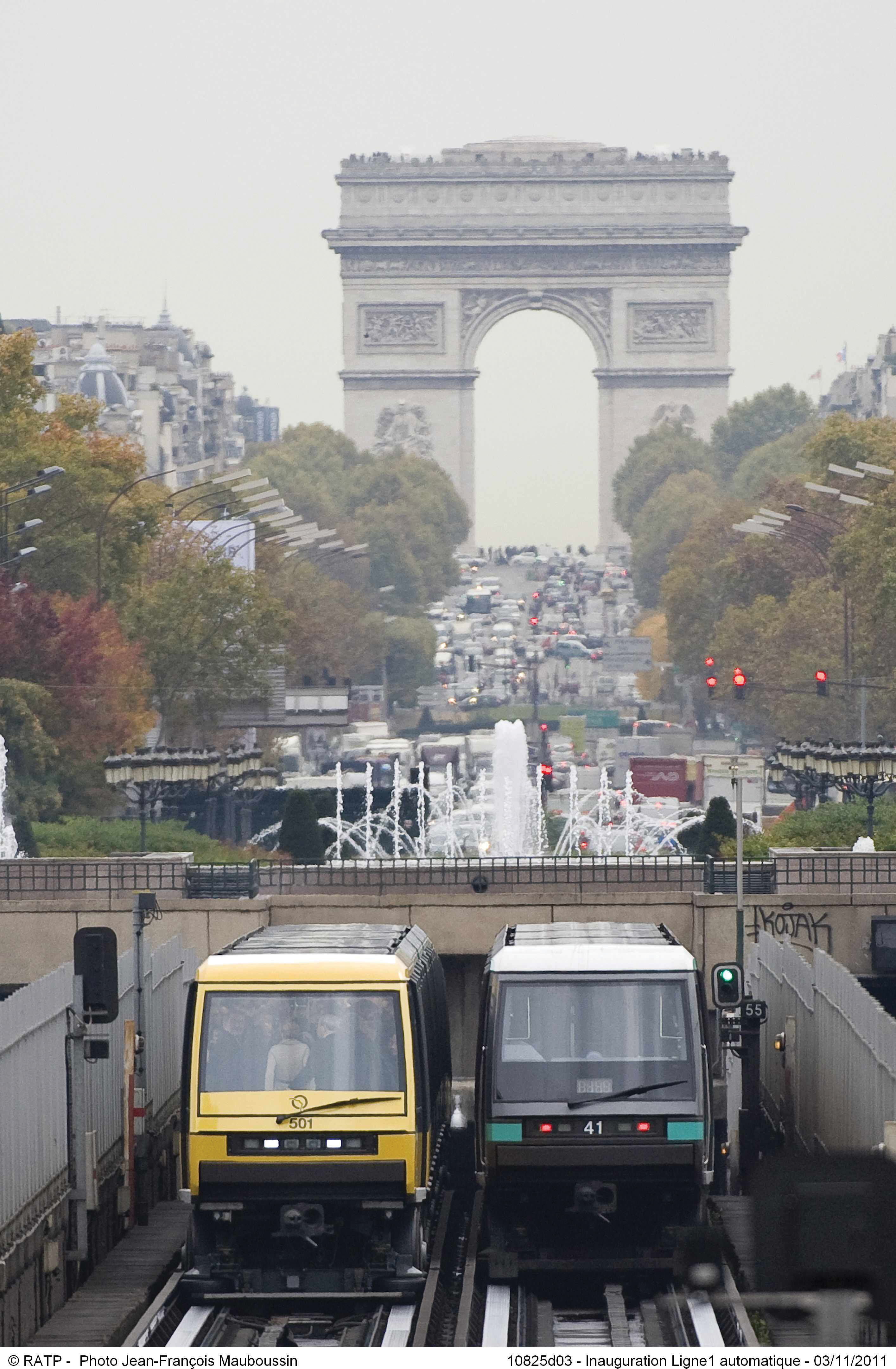
Automatic and manually driven trains are running concurrently on the Paris Metro
Pierre Mongin, chairman and CEO of 4223 RATP has today inaugurated the commissioning of the first automatic trains on Line 1 of the 4224 Paris Metro in the presence of Nathalie Kosciusko-Morizet, minister for ecology, sustainable development, transportation and housing and Jean-Paul Huchon, president of the regional council of Île-de-France.
The commissioning of the first automatic trains on this line, Paris Metro’s oldest and most popular line, with 725,000 passengers per day, is a world first in terms of technology and organisation.
For the first time, a subway line has been automated without any major interruption to services. In addition, until December 2012, when all trains will be automated, RATP is combining both automatic and manually driven trains on the same line.
As RAPT points out, this is a true challenge for its engineers given the importance of the line. Starting this autumn, eight automatic trains will run in tandem with “classic” trains, and the integration will continue at a rate of two new trains per month.
The automation of Line 1 was undertaken in the context of the overall modernisation of the subway, and financed entirely by RATP at a cost of €600 million (US$828 million), which was only an additional four per cent compared to the investment that would have been necessary to replace the Line’s current equipment.
In carrying out this dual challenge of technology and organisation for such an important line, RATP says it has confirmed its real expertise in the design and operation of automated metro systems, strengthening its global leadership in this area.
This technological change has become necessary to deal with the steady increase in passenger traffic. One of the main benefits of automation is the Line’s ability to react instantly to an increase in passengers and provide the number of trains required for optimum operation of the line. The installation of 954 platform screen doors on all the lines’ platforms will contribute significantly to the smooth running of the line, avoiding interruptions associated with track intrusions, while also enhancing passenger safety. Intercoms have been installed to allow contact with a supervisor at the command centre (PCC) at all times. Onboard cameras will allow supervisors to instantly assess live situations and make real-time decisions while remaining in contact with passengers.
Line 1 will also benefit from a newly developed and colourful design: a red floor and multicoloured stripes on the seat covers, new lighting to accentuate the impression of space, and four screens in each car which will provide passengers with continuous information.
Approved by the4225 Syndicat des Transports Île-de-France (STIF), the Greater Paris region’s transportation union, this project was also supported by staff. Drivers were offered customised professional development, or work on other lines, or the automatic system.
RAPT says the sophisticated technical equipment required for the automated line was developed with industry partners, all leaders in their areas, whether in computerised signalling, automatic trains or civil engineering, and demonstrate its progress in mastering new operating systems for urban transportation.
The commissioning of the first automatic trains on this line, Paris Metro’s oldest and most popular line, with 725,000 passengers per day, is a world first in terms of technology and organisation.
For the first time, a subway line has been automated without any major interruption to services. In addition, until December 2012, when all trains will be automated, RATP is combining both automatic and manually driven trains on the same line.
As RAPT points out, this is a true challenge for its engineers given the importance of the line. Starting this autumn, eight automatic trains will run in tandem with “classic” trains, and the integration will continue at a rate of two new trains per month.
The automation of Line 1 was undertaken in the context of the overall modernisation of the subway, and financed entirely by RATP at a cost of €600 million (US$828 million), which was only an additional four per cent compared to the investment that would have been necessary to replace the Line’s current equipment.
In carrying out this dual challenge of technology and organisation for such an important line, RATP says it has confirmed its real expertise in the design and operation of automated metro systems, strengthening its global leadership in this area.
This technological change has become necessary to deal with the steady increase in passenger traffic. One of the main benefits of automation is the Line’s ability to react instantly to an increase in passengers and provide the number of trains required for optimum operation of the line. The installation of 954 platform screen doors on all the lines’ platforms will contribute significantly to the smooth running of the line, avoiding interruptions associated with track intrusions, while also enhancing passenger safety. Intercoms have been installed to allow contact with a supervisor at the command centre (PCC) at all times. Onboard cameras will allow supervisors to instantly assess live situations and make real-time decisions while remaining in contact with passengers.
Line 1 will also benefit from a newly developed and colourful design: a red floor and multicoloured stripes on the seat covers, new lighting to accentuate the impression of space, and four screens in each car which will provide passengers with continuous information.
Approved by the
RAPT says the sophisticated technical equipment required for the automated line was developed with industry partners, all leaders in their areas, whether in computerised signalling, automatic trains or civil engineering, and demonstrate its progress in mastering new operating systems for urban transportation.





